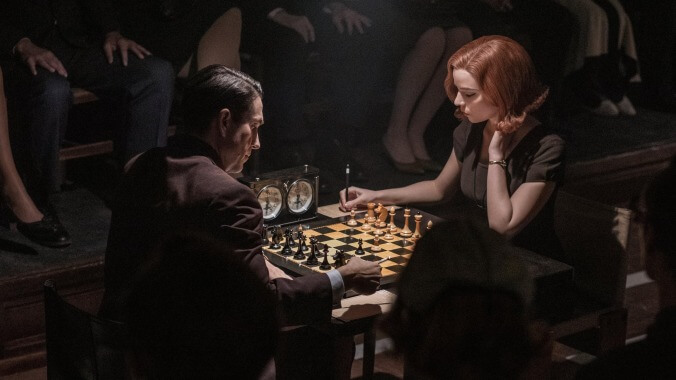Netflix settles Queen’s Gambit defamation suit over real-life female chess player
A number of real people have objected to their depiction in works of fiction lately

It was a near miss for the U.S. legal system today, which almost had to deal with making some kind of official legal ruling on how much creative license you’re allowed to have when you mention a real person in a work of fiction. But that sounds like a lot of work, and, thankfully, nobody has to worry about it just yet. That’s because Netflix has decided to settle with Georgian chess champion Nona Gaprindashvili, who sued the streaming service last year over a line in chess drama The Queen’s Gambit that she felt was a “grossly sexist” dismissal of her actual achievements. (Because, unlike Anya Taylor-Joy’s Queen’s Gambit character, Nona Gaprindashvili is a real person.)
Near the end of the ‘60s-set Queen’s Gambit, a commentator talks about how impressive it is that Taylor-Joy’s Beth Harmon is playing chess against men, even though female chess players aren’t all that rare: “There’s Nona Gaprindashvili,” the character says, “but she’s the female world champion and has never faced men.” In reality, though, Nona Gaprindashvili had played against men that point. A lot of them, in fact. So, as the lawsuit frames it, in order to make fictional chess player Beth Harmon more impressive, Netflix this real chess player sound less impressive.
Earlier this year, Netflix tried to get the lawsuit dismissed, partially by pointing to a similar lawsuit from a few years ago when Olivia de Havilland sued Ryan Murphy and FX over Feud: Bette And Joan, which included a scene where Catherine Zeta Jones—playing de Havilland—called Joan Fontaine a “bitch.” The real de Havilland insisted that she would never say that, but a court eventually tossed the suit on the grounds that FX was allowed to interpret history in its own way and that real people don’t necessarily have veto power over every work of fiction in which they’re depicted.
But in this case, a judge decided that Gaprindashvili’s defamation claims held a little more water than de Havilland’s, so that defense wasn’t going to fly. So, before this could become a very complicated and very important case for the future of Hollywood and what things you are and are not allowed to say about real people in fiction, Netflix decided to settle with Gaprindashvili.
This comes from Variety, which says that the terms of whatever kind of deal Netflix made with Gaprindashvili were not disclosed. Also, this comes about a week after Netflix was hit with a similar lawsuit from former Vanity Fair photo editor Rachel Williams over her portrayal in Inventing Anna that is still ongoing.